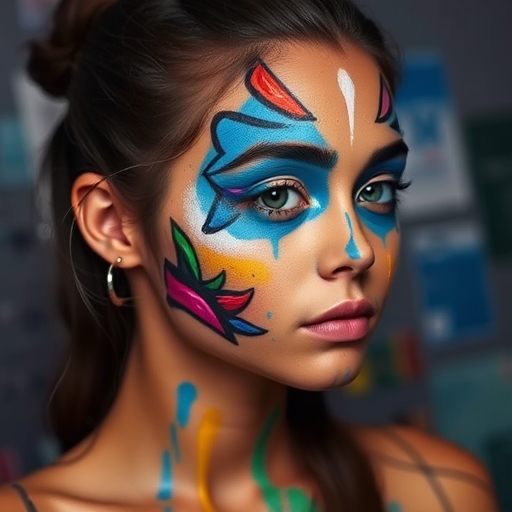Can You Put Acrylic Paint on Your Face?
Acrylic paint is a versatile medium that artists use for various projects, from canvas paintings to crafts. However, when it comes to applying acrylic paint on the skin, particularly on the face, many people have questions about safety, effectiveness, and the potential for skin reactions. In this article, we will explore whether you can put acrylic paint on your face, the risks involved, and what alternatives are safer for face painting.
Understanding Acrylic Paint
Before diving into whether acrylic paint is safe for facial application, it’s essential to understand what acrylic paint is and its common uses.
What is Acrylic Paint?
Acrylic paint is a fast-drying paint made of pigment suspended in acrylic polymer emulsion. It is water-soluble when wet but becomes water-resistant when dry. Acrylic paint is popular among artists for its versatility, vibrant colors, and quick drying time.
Common Uses of Acrylic Paint:
- Canvas painting
- Crafts and DIY projects
- Home decor
- Model painting
- Pigments: These provide color and can vary in toxicity.
- Binder: The acrylic polymer that holds the pigments together.
- Additives: These can include preservatives, surfactants, and other chemicals to improve texture and drying time.
- Redness
- Itching
- Rash
- Swelling
- Use brushes or sponges specifically designed for face painting.
- Avoid applying paint near sensitive areas, such as the eyes and mouth.
Composition of Acrylic Paint
Acrylic paint typically consists of:
Can You Use Acrylic Paint on Your Face?
The short answer is no. While acrylic paint is non-toxic in small amounts and is safe for general use, it is not designed for application on the skin, especially the face. Here are several reasons why you should avoid using acrylic paint on your skin:
1. Skin Irritation and Allergic Reactions
Acrylic paints contain various chemicals that can irritate the skin. Common symptoms of skin irritation include:
If you have sensitive skin or allergies, you are more likely to experience adverse reactions.
2. Toxicity Concerns
Some acrylic paints contain pigments that can be toxic if absorbed through the skin. For example, certain colors may contain heavy metals such as cadmium or cobalt, which can be harmful.
3. Difficulty in Removal
Acrylic paint is designed to be water-resistant once dry, making it challenging to remove from the skin. This can lead to prolonged exposure, increasing the risk of irritation and allergic reactions.
4. Not Breathable
Acrylic paint forms a solid layer on the skin that can trap sweat and oils, potentially leading to clogged pores and acne.
Safe Alternatives for Face Painting
If you are looking to paint your face for a special occasion, event, or costume, there are safer alternatives specifically designed for skin application.
1. Face Paints
Face paints are formulated to be safe for use on the skin and are often water-based, making them easy to apply and remove. They come in various colors and finishes, allowing for creativity without the risks associated with acrylic paint.
2. Body Paints
Similar to face paints, body paints are designed for larger areas of the body and are made from skin-safe ingredients. They are also easily removable and come in various formulations, including water-based and oil-based options.
3. Makeup Products
Standard makeup products, such as eyeshadows, lipsticks, and face paints, are also safe to use on the skin. They are specifically formulated for facial application and are often non-toxic.
4. Temporary Tattoos
For designs that last longer than typical face paint, temporary tattoos are a safe option. They can be applied easily and removed without harsh chemicals.
Comparison Table: Acrylic Paint vs. Face Paint
| Feature | Acrylic Paint | Face Paint |
|---|---|---|
| Skin Safe | No | Yes |
| Water-Resistant | Yes | Varies (most are water-based) |
| Easy to Remove | Difficult | Easy (usually with soap and water) |
| Irritation Risk | High | Low (if hypoallergenic) |
| Color Variety | Wide range | Wide range |
| Purpose | Art and crafts | Face and body decoration |
Tips for Safe Face Painting
If you decide to paint your face, follow these tips for a safe and enjoyable experience:
1. Choose Skin-Safe Products
Always opt for products specifically labeled as face paint or body paint. Check for certifications and hypoallergenic labels.
2. Conduct a Patch Test
Before applying any product to your face, perform a patch test on a small area of skin to check for any allergic reactions.
3. Use Proper Application Techniques
4. Remove Paint Properly
After your event, remove the face paint gently with soap and water or a makeup remover designed for sensitive skin. Avoid scrubbing harshly, as this can irritate the skin.
5. Keep Skin Moisturized
After removing face paint, apply a gentle moisturizer to keep your skin hydrated.
FAQ
Is it safe to use acrylic paint for body art?
No, acrylic paint is not safe for body art. Use products specifically designed for skin application instead.
What should I do if I get acrylic paint on my skin?
Wash the affected area with soap and water immediately. If irritation occurs, consult a healthcare professional.
Can I use acrylic paint on my nails?
While some people use acrylic paint on nails, it is not recommended for long-term use. Use nail polish or products made for nail art instead.
How do I choose safe face paint?
Look for face paints that are labeled as hypoallergenic, non-toxic, and specifically designed for use on the skin.
Can I mix face paint colors?
Yes, most face paints can be mixed to create new colors. However, ensure that the products are compatible and safe for skin use.
Conclusion
While the allure of vibrant colors and artistic expression may tempt you to use acrylic paint on your face, the risks far outweigh the benefits. Acrylic paint is not designed for skin application and can lead to irritation, allergic reactions, and difficulty in removal. Instead, opt for face paints and body paints that are safe for skin use, ensuring a fun and creative experience without compromising your health. Always prioritize safety, and enjoy your creative endeavors!

